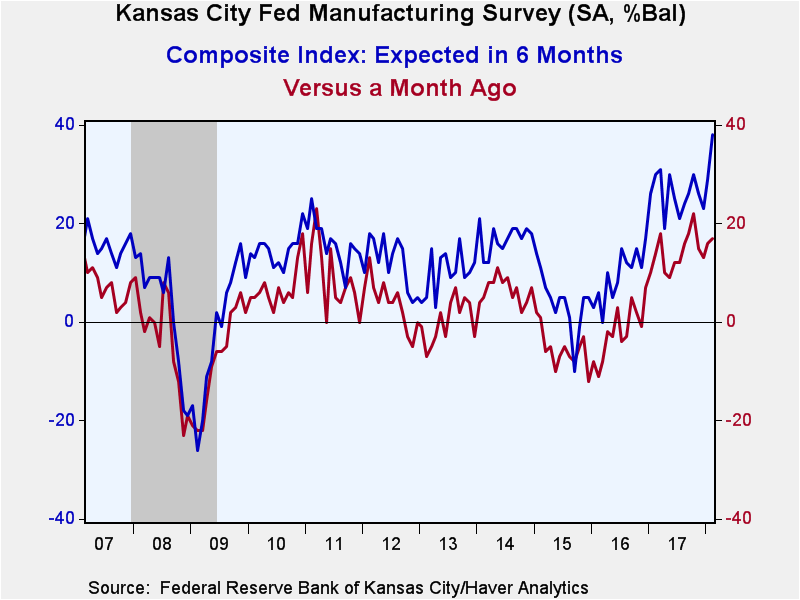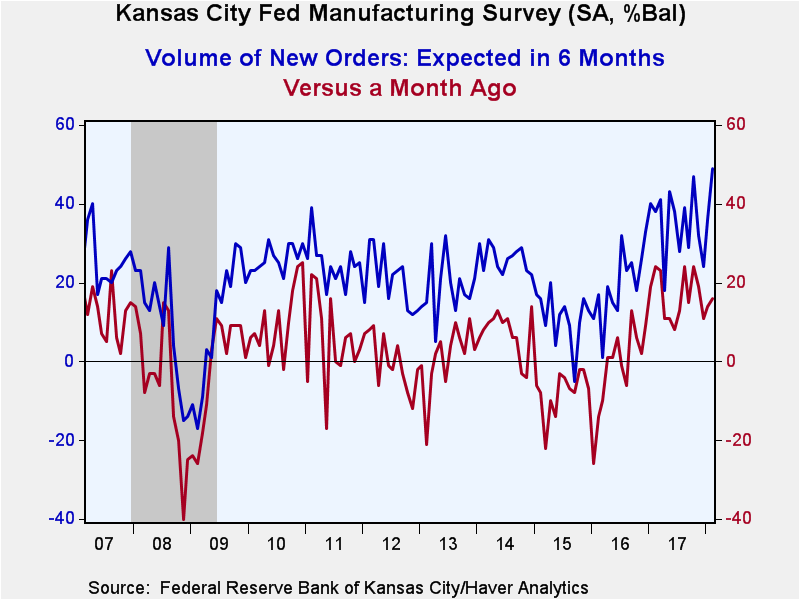 Global| Feb 23 2018
Global| Feb 23 2018Kansas City Federal Reserve Factory Index Advances
by:Tom Moeller
|in:Economy in Brief
Summary
The Federal Reserve Bank of Kansas City reported that its index of regional manufacturing sector business activity rose to 17 during February, the highest level since October. The index was up from -12 in December 2015. The ISM- [...]
The Federal Reserve Bank of Kansas City reported that its index of regional manufacturing sector business activity rose to 17 during February, the highest level since October. The index was up from -12 in December 2015.
The ISM-Adjusted index similarly improved in February to a level of 58.2 (NSA), up from 41.5 in December 2015. During the last ten years, there has been a 57% correlation between this index and the q/q change in real GDP.
Movement amongst the index components was mixed including a sharply higher shipments reading. New orders & production also strengthened. Finished goods inventories rose modestly. To the downside, export orders retraced two months of increase and order backlogs eased. The fall in the supplier delivery times index suggested modestly quicker delivery speeds, but they remained sharply slower than those in 2015.
Employment strengthened to the highest level since October 2004. Thirty-three percent of respondents reported increased hiring while 13% reported a decline in job levels. The employee workweek measure rebounded following a January decline, to the highest level since last March.
The index of finished goods prices surged to the highest level since August 2008. Twenty-eight percent of respondents paid higher prices, while three percent paid less. The raw materials prices index similarly strengthened to the highest point since May 2011.
The overall expectations index surged, reflecting a record level of confidence. (The series dates back to 1981.) Expected orders, shipments and production each strengthened, while expected capital expenditures remained near the series' record. Expected export orders eased m/m but remained near the seven-year high. Expected employment increased to the highest level since March of last year, and the expected workweek approximated the series' high.
Expected finished goods prices also jumped to the highest level since August 2008, and expected raw materials prices similarly surged.
The diffusion indexes are calculated as the percentage of total respondents reporting increases minus the percentage reporting declines. The survey included 94 responses from plants in Colorado, Kansas, Nebraska, Oklahoma, Wyoming and northern New Mexico. Data for the Kansas City Fed Survey can be found in Haver's SURVEYS database.
Estimating and Projecting Potential Output Using CBO's Forecasting Growth Model from the Congressional Budget Office can be found here.
| Kansas City Federal Reserve Manufacturing Survey (SA) | Feb | Jan | Dec | Feb '17 | 2017 | 2016 | 2015 |
|---|---|---|---|---|---|---|---|
| Conditions Versus One Month Ago (% Balance) | 17 | 16 | 13 | 14 | 14 | -2 | -5 |
| ISM-Adjusted Composite Index (NSA) | 58.2 | 57.3 | 54.3 | 56.3 | 56.7 | 48.5 | 46.8 |
| New Orders Volume | 16 | 14 | 11 | 24 | 17 | -2 | -8 |
| Number of Employees | 23 | 18 | 16 | 16 | 15 | -6 | -10 |
| Production | 21 | 16 | 16 | 13 | 17 | 0 | -5 |
| Prices Received for Finished Product | 26 | 21 | 11 | 3 | 7 | -7 | -5 |
| Expected Conditions in Six Months | 38 | 29 | 23 | 30 | 26 | 9 | 4 |
| New Orders Volume | 49 | 36 | 24 | 38 | 35 | 19 | 11 |
| Number of Employees | 41 | 33 | 36 | 31 | 31 | 8 | 6 |
| Production | 56 | 37 | 29 | 43 | 41 | 20 | 12 |
| Prices Received for Finished Product | 53 | 44 | 31 | 24 | 27 | 7 | 9 |
Tom Moeller
AuthorMore in Author Profile »Prior to joining Haver Analytics in 2000, Mr. Moeller worked as the Economist at Chancellor Capital Management from 1985 to 1999. There, he developed comprehensive economic forecasts and interpreted economic data for equity and fixed income portfolio managers. Also at Chancellor, Mr. Moeller worked as an equity analyst and was responsible for researching and rating companies in the economically sensitive automobile and housing industries for investment in Chancellor’s equity portfolio. Prior to joining Chancellor, Mr. Moeller was an Economist at Citibank from 1979 to 1984. He also analyzed pricing behavior in the metals industry for the Council on Wage and Price Stability in Washington, D.C. In 1999, Mr. Moeller received the award for most accurate forecast from the Forecasters' Club of New York. From 1990 to 1992 he was President of the New York Association for Business Economists. Mr. Moeller earned an M.B.A. in Finance from Fordham University, where he graduated in 1987. He holds a Bachelor of Arts in Economics from George Washington University.
More Economy in Brief
 Global| Feb 05 2026
Global| Feb 05 2026Charts of the Week: Balanced Policy, Resilient Data and AI Narratives
by:Andrew Cates










